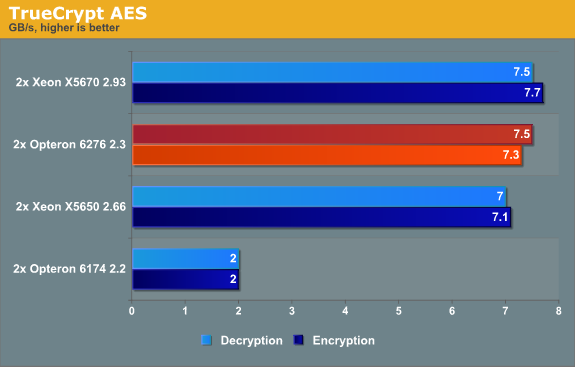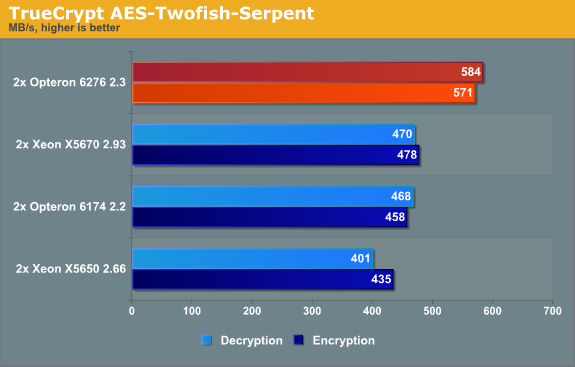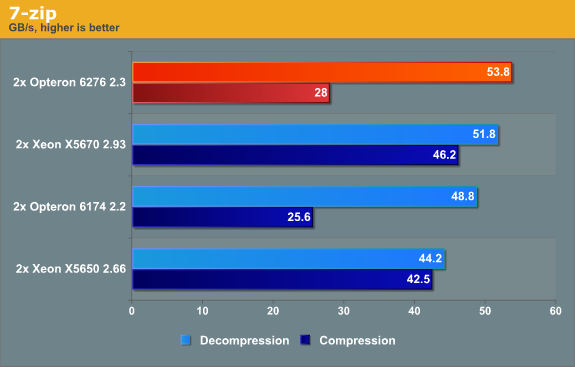Bulldozer for Servers: Testing AMD's "Interlagos" Opteron 6200 Series
by Johan De Gelas on November 15, 2011 5:09 PM ESTTrueCrypt 7.1 Benchmark
TrueCrypt is a software application used for on-the-fly encryption (OTFE). It is free, open source and offers full AES-NI support. The application also features a built-in encryption benchmark that we can use to measure CPU performance. First we test with the AES algorithm (256-bit key, symmetric).

You can compare those numbers directly with Anand's benchmark here. The Core i7-2600K at 3.4GHz delivers 3.4GB/s and the AMD FX-8150 at 3.6GHz about the same 3.3GB/s. We get about 2.3 times the performance here with four times as many "cores", but at 2.3GHz instead of 3.6GHz.
We also test with the heaviest combination of the cascaded algorithms available: Serpent-Twofish-AES.

The combination benchmark is limited by the slowest algorithms: twofish and serpent. The huge advantage that the architectures (Opteron "Bulldozer" and Xeon "Westmere") which support AES-NI had has evaporated: the Opteron 6174 keeps up with the best Xeons. The Opteron 6276 can leverage its higher threadcount as this benchmark scales extremely well.
It is good to realize that these benchmarks are not real-world but rather synthetic. It would be better to test a website that does some encrypting in the background or a fileserver with encrypted partitions. In that case the encryption software is only a small part of the total code being run. A large performance (dis)advantage might translate into a much smaller performance (dis)advantage in that real-world situation.
For example, eight times faster encryption resulted in a website with 23% higher throughput and a 40% faster encrypted file (see here). The advantage that the Xeon had in the first benchmark will not be noticeable, and the Opteron's 24% higher performance will translate into a few percentage points. But this is a benchmark where AMD's efforts to get a 16 integer cores inside a 115W TDP pay off.
7-Zip 9.2
7-zip is a file archiver with a high compression ratio. 7-Zip is open source software, and most of the source code is under the GNU LGPL license

Compression is more CPU intensive than decompression, and the latter depends a little more on memory bandwidth. When it comes to load/stores and memory bandwidth, the Opteron 6276 is unbeateable. We've also seen indications that Bulldozer's cache does very well in reads but not so well in writes, and that could account for some of the gap between the compress/decompress results.
Compression is for a part determined by the quality of the branch predictor (higher than normal branch mispredictions on mediocre branch predictors). The Opteron 6276 has a better branch predictor than the Opteron 6174, but the branch misprediction penalty has grown from 12 to 20 cycles. As a result, a single branch intensive thread runs slower (see Anand's tests) on the newest AMD architecture. Luckily, the AMD Opteron 6276 can compensate for this with its 16 threads (vs 12 threads for the Opteron 6172) and a little bit of help from Turbo Core.
Intel still has the best branch predictors in the industry. The result is that the Xeon is by far the fastest compressor. The end result is that the Xeon is the more rounded CPU in this discipline.










106 Comments
View All Comments
UberApfel - Wednesday, November 16, 2011 - link
If anyone finds me a madman; let me explain this simply by example. Benchmark choices aside...If this test were to compare any of the top or middle-tier processors on the "AMD vs. Intel 2-socket SKU Comparison" chart ( http://www.anandtech.com/show/5058/amds-opteron-in... ) with their matching competition; this article would tell a different story in essence. Which does in fact, regardless of how fair the written conclusion may be, makes it biased.
Examples:
X5650 vs 6282 SE
E5649 vs 6276
E5645 vs 6272
JohanAnandtech - Thursday, November 17, 2011 - link
"Yet handpicking the higher clocked Opteron 6276 (for what good reason?) seems to be nothing but an aim to make the new 6200 series seem un-remarkable in both power consumption and performance"Do you realize you are blaming AMD? That is the CPU they sent us.
"The 6272 is cheaper, more common, and would beat the Xeon X5670 in power consumption which half this review is weighted on."
The 6272 is nothing more than a lower speedbin of the 6276. It has the same power consumption but slightly lower performance. Performance/wat is thus worse.
"PostgreSQL/SQLite? Facebook's HipHop? Node.js? Java? Something relevant to servers and not something obscure enough to sound professional? "
We use Zimbra, Phpbb, Apache, MySQL. What is your point? that we don't include every server software on the planet? If you look around how many publications are running good repeatable server benchmarks? If it would be so easy as running Cinebench or Truecrypt, I think everybody would be.
"Even the chart on Page 1 is designed to make Intel look superior all-around. For what reason would you exclude the Opteron 4274 HE (65W TDP) or the Opteron 4256 EE (35W TDP) from the 'Power Optimized' section?"
To be honest, those CPUs were not even in AMD's presentation that we got. We were only briefed about Interlagos.
UberApfel - Thursday, November 17, 2011 - link
Did they send you the Xeon X5670 also? I suppose who's ever handling media relations at AMD is either careless or disgruntled. eg. Sending a slightly overclocked processor with a 30% staple that happens to scale unusually bad in terms of power efficiency.Please just answer this honestly; if you had compared a Opteron 6272 w/ a E5645 ... would your article present a different story?
Fair as you may have tried to be; you don't have to look far to find a comment here that came to the "BD is a joke" conclusion.
---
Using a phpbb stress test is hardly useful or relevent as a server benchmark; nevermind under a VM. Unless configured extensively; it's I/O bound. "Average Response Time" is also irrelevant; how is the reader to know if your 'response time' does not favor processors better with single-threaded applications?
Additionally; VM's on a better single-threaded processor will score higher in benchmarks due to the overhead as parallelism isn't optimized. Yet these results make zero sense in real-world usage. It contradicts the value of VM's; flexible scalability for low-usage applications.
Finally; I'd estimate that less than 5% of servers are virtual (if that). VM's are most popular with web servers and even there they have a small market share as they only appeal to small clients. Large clients use clusters of dedicated; tiny clients use shared dedicated.
Did you even use gcc 4.7 or Open64? In some applications; the new versions yield up to 300% higher performance for Bulldozer.
JohanAnandtech - Thursday, November 17, 2011 - link
"if you had compared a Opteron 6272 w/ a E5645 ... would your article present a different story?"You want us to compare a $551 80W TDP Intel cpu with a $774 115 AMD CPU?
"Unless configured extensively; it's I/O bound."
We know how to monitor with ESX top. There is a reason why we have a disk system of 2 SDDs and 6 x 15k SAS disks.
"Average Response Time" is also irrelevant
Huh? That is like saying that 0-60 mph acceleration times are irrelevant to sports cars.
"Finally; I'd estimate that less than 5% of servers are virtual (if that)"
....Your estimate unfortunately was true in 2006. We are 2011 now. Your estimate is 10x off, maybe more.
UberApfel - Thursday, November 17, 2011 - link
"You want us to compare a $551 80W TDP Intel cpu with a $774 115 AMD CPU?"$539
"The 6272 is nothing more than a lower speedbin of the 6276. It has the same power consumption but slightly lower performance. Performance/wat is thus worse."
By your logic; the FX-8120 and FX-8150 have equal power consumption. They don't.
"We know how to monitor with ESX top. There is a reason why we have a disk system of 2 SDDs and 6 x 15k SAS disks."
It's still I/O bound unless configured extensively.
"Huh? That is like saying that 0-60 mph acceleration times are irrelevant to sports cars."
Yeah; it is if you're measuring the distance traveled by a number of cars. The opteron is obviously slower in handling single requests but it can handle maybe twice as many at the same time. Unless your stress test made every request @ T=0 and your server successfully qued them all, dropped none, and included the que time in the response time... it would favor the xeon immensely. Perhaps it does do all this; which is why I said "how is the reader to know" when you could have just as easily done 'Average Requests Completed Per Second'.
"....Your estimate unfortunately was true in 2006. We are 2011 now. Your estimate is 10x off, maybe more."
Very funny. Did the salesman that told you that also recommend these benchmarks? Folklore tells that Google alone has over a million servers, 20X that of Rackspace or ThePlanet, and they aren't running queries on VM's.
boomshine - Thursday, November 17, 2011 - link
I hope you included MS SQL 2008 performance just like in opteron 6174 review:http://www.anandtech.com/show/2978/amd-s-12-core-m...
JohanAnandtech - Thursday, November 17, 2011 - link
Yes, that test failed to be repeatable for some weird reason. We will publish it as soon as we get some reliable numbers out of it.JohanAnandtech - Thursday, November 17, 2011 - link
"SMT can only execute a single thread at once. "The whole point of SMT is to have one thread in one execution and another thread in the other execution slot.
In fact, the very definition of SMT is that two or more threads can execute in parallel on a superscalar execution engine.
TC2 - Thursday, November 17, 2011 - link
another joke from AMD with their BD "server-centric" architecture - bla-bla! amd 8\16 against intel 6\12 and again can't win!pcfxer - Thursday, November 17, 2011 - link
" make of lots of DLLs--or in Linux terms, they have more dependencies"Libraries is the word you're looking for.
I also see the mistake of mixing programming APIs/OS design/Hardware design...
Good software has TLBs, asynchronous locking where possible, etc, as does hardware but they are INDEPENDENT. The glue as you know, is how compiled code is treated at the uCode level. IMO, AMD hardware is fully capable of outperforming Intel hardware, but AMD uCode is incredibly good.